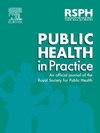Creating a healthier economy: A rapid evidence review of inequalities in flexible working arrangements in the UK
IF 1.9
Q2 PUBLIC, ENVIRONMENTAL & OCCUPATIONAL HEALTH
引用次数: 0
Abstract
Objectives
Flexible working – the control people have over work scheduling to meet wellbeing needs – is one way to help create a healthier economy. We sought to identify and summarise evidence about inequalities in access to flexible working arrangements in the UK and implications for health and wellbeing to inform policy development.
Study design
Rapid evidence review.
Methods
A rapid review of peer-reviewed articles and reports from trusted sources was completed on inequalities in access to UK flexible working arrangements to inform regional and local policy development. Published articles were identified through database searches (OVID-Embase, Scopus, Cochrane, Assia-Proquest) in September–October 2024. Data was extracted directly into a table and findings synthesised narratively by theme.
Results
Evidence identified was limited in detail, but consistent in reporting inequalities in access to flexible working by occupational status, with some evidence of inequalities by gender, disability, geography and ethnicity; with implications for health promotion. There was limited detail on specific health outcomes or pathways to impacts, though the significance of flexible working for women's well-being and Disabled people was highlighted. Included evidence noted systemic issues in the UK economy (e.g. occupational hierarchies, gendered norms about caring, racism, disability discrimination, ‘ideal worker’ culture that values overwork, flexibility stigma) that contribute to flexible working inequalities.
Conclusions
Further research and multi-level policy action is needed to address flexible working inequalities to promote health. Research could usefully focus on intersectional inequality, including systemic societal processes (i.e. stigma, racism, discrimination) shaping flexible working in practice. Policy action could include: evaluating the implementation of existing flexible working legislation in relation to inequality; national-regional-local action to support inclusive business models in which the bargaining positions of employees around flexibility are more equalised (e.g. cooperatives); evaluation and strengthening of Fair Work Charters; and funding and showcasing of flexible working pilots focused on addressing unequal flexible working access.
创建更健康的经济:对英国灵活工作安排不平等的快速证据审查
灵活的工作——人们对工作安排的控制以满足健康需求——是帮助创造更健康经济的一种方式。我们试图确定和总结有关英国灵活工作安排不平等的证据,以及对健康和福祉的影响,为政策制定提供信息。研究设计快速证据回顾。方法对来自可靠来源的同行评议文章和报告进行了快速审查,内容涉及英国灵活工作安排的不平等,为区域和地方政策制定提供信息。通过数据库检索(OVID-Embase, Scopus, Cochrane, asia - proquest)确定2024年9 - 10月发表的文章。数据被直接提取到表格中,结果按主题进行综合叙述。结果所确定的证据细节有限,但在报告弹性工作机会不平等方面是一致的,有一些证据表明性别、残疾、地理和种族存在不平等;对促进健康有影响。虽然强调了灵活工作对妇女福利和残疾人的重要性,但关于具体健康结果或产生影响的途径的细节有限。包括证据表明,英国经济中的系统性问题(例如职业等级、关于关怀的性别规范、种族主义、残疾歧视、重视过度工作的“理想工人”文化、灵活性污名)导致了灵活工作的不平等。结论解决弹性工作不平等问题需要进一步的研究和多层次的政策行动,以促进健康。研究可以有效地关注交叉不平等,包括在实践中形成灵活工作的系统性社会过程(即耻辱、种族主义、歧视)。政策行动可包括:评估与不平等有关的现有灵活工作立法的执行情况;采取国家-区域-地方行动,支持包容性商业模式,使雇员在灵活性方面的谈判地位更加平等(例如合作社);评估和加强《公平工作宪章》;资助和展示灵活工作试点项目,重点是解决不平等的灵活工作机会。
本文章由计算机程序翻译,如有差异,请以英文原文为准。
求助全文
约1分钟内获得全文
求助全文

 求助内容:
求助内容: 应助结果提醒方式:
应助结果提醒方式:


